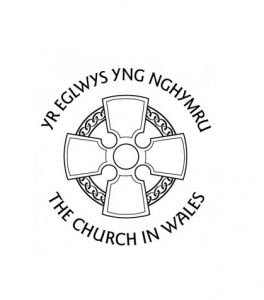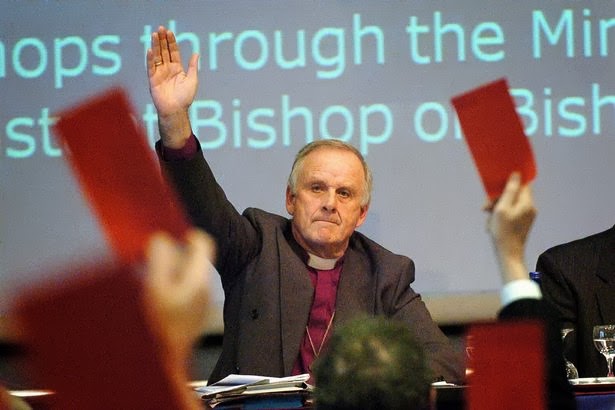 At the recent meeting of the Governing Body of the Church in Wales, the Bench of Bishops in Wales distributed a letter to the representatives present. In the letter the bishops stated that starting with the first Sunday in Advent, anyone who has been baptized, regardless of their age or whether they have received confirmation, is welcome to receive communion in the parishes of the Church in Wales. This is slightly more welcoming than the Church of England canon that welcomes baptized folks to communion, but with a proviso;
At the recent meeting of the Governing Body of the Church in Wales, the Bench of Bishops in Wales distributed a letter to the representatives present. In the letter the bishops stated that starting with the first Sunday in Advent, anyone who has been baptized, regardless of their age or whether they have received confirmation, is welcome to receive communion in the parishes of the Church in Wales. This is slightly more welcoming than the Church of England canon that welcomes baptized folks to communion, but with a proviso;
There shall be admitted to the Holy Communion:
[…]
(b) baptized persons who are communicant members of other Churches which subscribe to the doctrine of the Holy Trinity, and who are in good standing in their own Church.
The Church of England
Canon B15A
A Pastoral Letter from the Bishops of the Church in Wales to all the faithful concerning Admission to Holy Communion
The Church, as the Body of Christ, has both Word and Sacrament to nourish and sustain its members. Down through the centuries, the Church has been called to the faithful preaching of the Word and the administration of the Sacraments as part of God’s mission and witness to his Kingdom.
From about the fifth century, it became common in the western Church to separate the Sacrament of Baptism (in which a person is joined to the Body of Christ, and sacramentally with Christ’s death and resurrection) from the ceremony of Confirmation, when the bishop, as chief pastor, welcomes the newly baptised, and lays hands upon them praying for the strengthening of the Holy Spirit. From the thirteenth century, it became customary also not to admit anyone to the Sacrament of Holy Communion unless or until they had received the sacramental act of Confirmation.
Thus three ceremonies which the early Church had held together were separated, and the pattern was established with which Anglicans are familiar (of Baptism in infancy, of Confirmation at puberty, and Communion thereafter). These developments seemed expedient at the time that they were implemented, but in so doing, a great truth was obscured: the Sacrament of Baptism, commanded by Our Lord, is in fact the whole ceremony, entire and complete in itself, by which a person is incorporated into Christ, and recognised as a Christian.
In the Church today, there are many who believe that the witness of the Church to Jesus Christ, and the process of nurturing children and young people in the Christian faith, would be immeasurably strengthened by recovering this earliest symbolism. Baptism alone should be seen as the gateway into participation in the life of the Church, including admission to the Sacrament of Holy Communion.
In conjunction with advice from the Doctrinal Commission of the Church in Wales, and from the Governing Body, the Bench of Bishops wishes now to re-adopt the practice of the early Church with respect to admission to Holy Communion. It is our conviction that all the baptised, by virtue of their Baptism alone, are full members of the Body of Christ and qualified to receive Holy Communion.
We have taken note of the existing rubrics and the teaching found in the Catechism of the Book of Common Prayer of the Church in Wales. We have also taken advice from the Legal Sub-Committee of the Governing Body and have been given the assurance that such a step does not require any change in the present Canon Law or Constitution of the Church in Wales. We have also received advice from them of civil law implications in taking this step.
With all this in mind, as of the First Sunday of Advent this year, 27th November 2016, we are giving permission for all those who are baptised in water and in the name of the Holy Trinity, to receive Holy Communion at the Celebration of the Holy Eucharist within our dioceses and jurisdictions. None is required so to receive, but no barrier should be erected to prevent all the baptised from making their Communion, other than that which is required by civil law.
Of course, this decision raises important questions for the life of the Church. We have asked for assistance in preparing materials which can be used in our parishes and Ministry and Mission Areas to instruct the faithful on the meaning and significance of this change.
Since we remain, as a Church, committed to the Baptism of Infants, even the youngest of children would be entitled to receive Holy Communion under these provisions. However, while this will be permitted by the theology of the Church, it will not always be appropriate to administer Communion in both kinds. The civil law does not permit the administration of alcohol to children under the age of five, and even thereafter parental permission is required before a child may receive Communion from the chalice. It will be important for parishes and clergy to establish good practice by ensuring that clear records are kept of what permissions are given, and Communion in all other cases would have to be in the one kind (the bread).
In lifting the customary barriers to Communion, we are mindful that this opens out as well a new and strengthened understanding of the Rite of Confirmation. It will be no longer the gateway to Communion, but take its proper place in the sacramental acts of the Church as a channel of God’s grace, affirming disciples of their place in the fellowship of the Church and commissioning them for service in the Church and world. We have asked the Standing Liturgical Advisory Commission to prepare work on a new Rite of Confirmation that will reflect more clearly this understanding.
We entrust the Church in Wales to God’s good care and grace, and pray that, as we acknowledge the place of all the baptised at the Eucharist, he may renew our life in him and the commission we receive to his service, so that we might all grow in grace, and bear witness to his love in the world.
The Bench of Bishops
September 2016
A jpeg of the letter is available on the website of the Diocese of St Davids.
The photo is of the Most Revd Dr Barry Morgan participating at a past meeting of the Church in Wales’ Governing Body. Dr Morgan is the Archbishop of Wales and so, the Primate & Metropolitan of the Church in Wales. He is also the bishop diocesan of the Diocese of Llandaff. Dr Morgan is the longest serving Primate in the Anglican Communion. On 23 AUG 2016, the Church in Wales announced that +Barry will retire on 31 JAN 2017.


